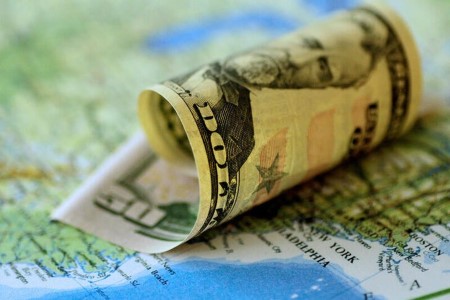




Policy Rate Updates: BSP outlook — cloudy with a chance of rate cut
 DOWNLOAD
DOWNLOAD

January Economic Update: Growth slows, prices rise
 DOWNLOAD
DOWNLOAD

Inflation Update: Up, up, and away?
 DOWNLOAD
DOWNLOAD


Dollar firm as Fed meeting and growth risks dominate

SINGAPORE, July 25 (Reuters) – The dollar was on a firm footing on Monday, as traders brace for a sharp US interest rate hike this week and look for safety as data points to a weakening global economy.
The greenback was up slightly against most majors early in the Asia session, trading at USD 1.0195 on the euro EUR=EBS and steadying Friday losses to buy 136.57 Japanese yen.
The US Federal Reserve concludes a two-day meeting on Wednesday and markets are priced for a 75-basis-point (bp) rate hike, with about a 9% chance of a 100 bp hike.
“Market reaction will turn on how hawkish Chair (Jerome)Powell sounds with his determination to reduce inflation in the face of slowing growth,” said National Australia Bank currency strategist Rodrigo Catril.
US growth data is also due out Thursday, though markets have already been rattled by a slew of soft business indicators in Europe, which snuffed out a rally in risk assets on Friday.
An energy crisis also hangs over the euro, while the trade-sensitive Australian and New Zealand dollars, which made one-month highs on Friday, have backed away.
The Aussie edged about 0.5% lower to USD 0.6892 and the kiwi was down by the same margin to USD 0.6223.
Australian consumer price data is due on Wednesday and a hot number could lend support by ramping up bets on rate hikes, though analysts warned the backdrop was mostly negative.
“The Australian dollar will mainly be a function of the world economic outlook,” said Commonwealth Bank of Australia’s head of international economics, Joe Capurso.
“The darkening outlook suggests the Aussie has more downside than upside risk and can test USD 0.6800 this week.”
Sterling GBP=D3 also slipped on Monday, even as markets reckon on a 60% chance the Bank of England would lift rates by 50 bp next week. It was last down 0.3% to USD 1.1970.
Bitcoin hovered at USD 22.278. The dollar rose 0.4% to buy 0.9641 Swiss francs. The US dollar index sat at 106.840, just below a two-decade high made in mid July at 109.290.
(Reporting by Tom Westbrook; Editing by Shri Navaratnam)
This article originally appeared on reuters.com





 By Reuters
By Reuters